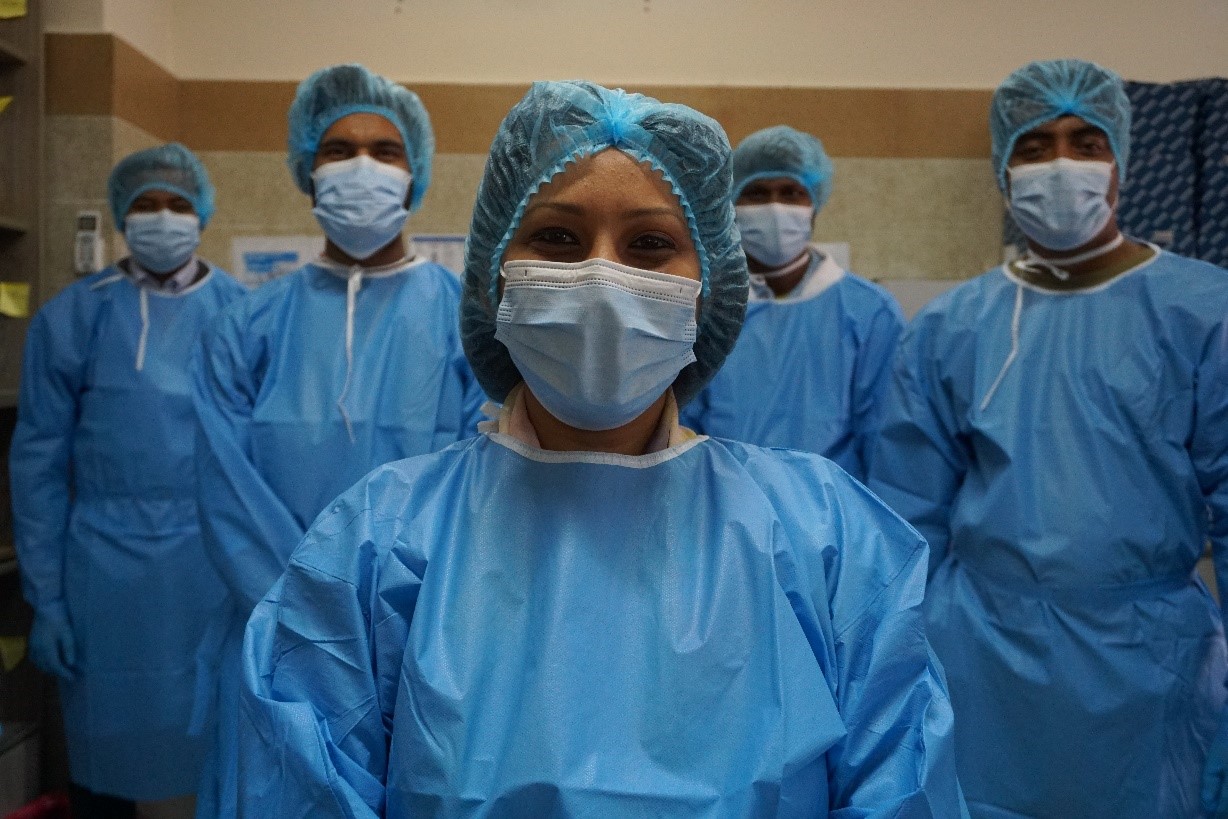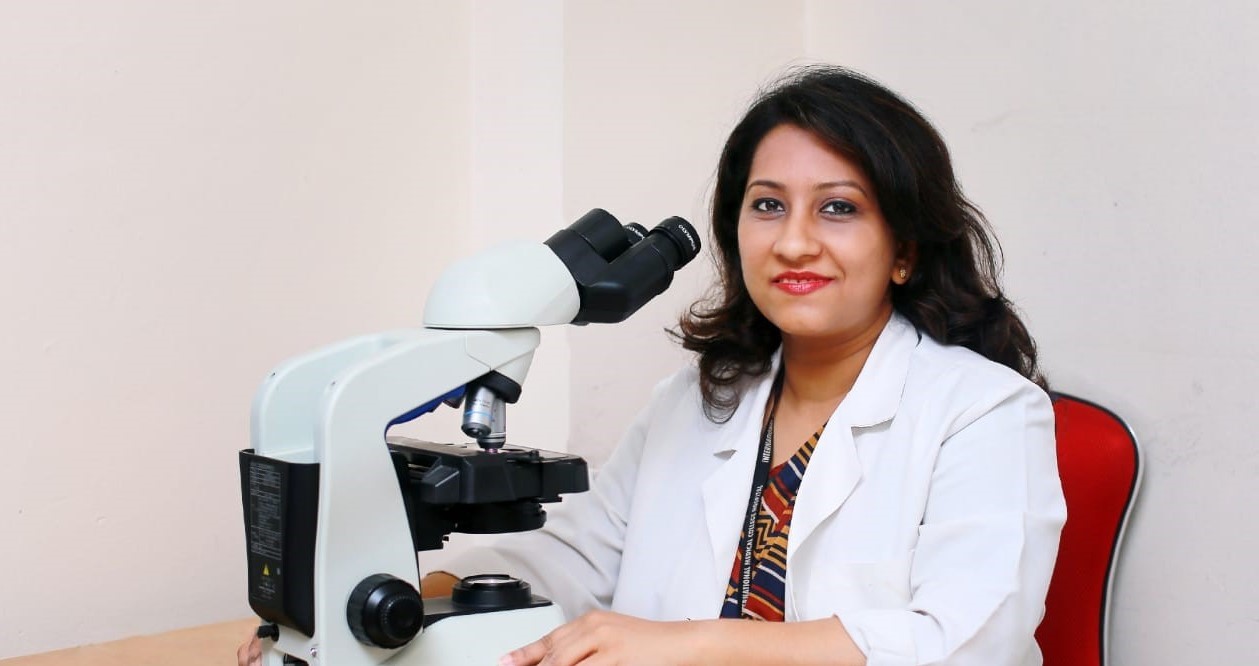As a woman, scientist, and mother, Dr Adneen Moureen is leading a hardworking team of 26 staff at the IEDCR Field Laboratory in Cox’s Bazar, supporting the response to COVID-19 in the world’s largest refugee camp.
At the Institute of Epidemiology, Disease Control and Research (IEDCR) Field Laboratory, rapidly available, reliable and large-scale testing is key to sustain the appropriate and targeted public health response to nearly five million people across three districts in Southern Bangladesh, including the world’s largest refugee camp.
On the International Day of Women and Girls in Science, we celebrate Dr Moureen, her team and the many who once dreamed beyond gender stereotypes to foster innovation in life-saving medicine and accelerate progress and sustainable development for all.
Remembering that science reflects the people who make it, by changing gender biased narratives and removing barriers that hold women and girls away from science related fields we are letting remarkable individuals shine and inspire generations to come.
 WHO Microbiologist and Laboratory Supervisor, Dr Adneen Moureen has been leading her team at the frontlines of the COVID-19 response in Cox’s Bazar. WHO Bangladesh/Tatiana Almeida
WHO Microbiologist and Laboratory Supervisor, Dr Adneen Moureen has been leading her team at the frontlines of the COVID-19 response in Cox’s Bazar. WHO Bangladesh/Tatiana Almeida
“Ever since I was a child, I have always wanted to know how the world worked. I was curious, inquisitive and totally unaware of the many struggles I would face”, recalls Dr Moureen. “I worked hard as a student, I still do. I truly was in my element throughout secondary school, medical college and internship. But when I got pregnant my mentors decided that I had made the wrong choice and it became nearly impossible to fight for a place”, she says sorrowfully.
Feeling that her future in medicine was fading away Dr Moureen, then a young mother, contemplated a post-graduation in research, investigation and microbiology. The very scientific know-how that would lead her to helping the IEDCR Field Laboratory achieve international quality standards in response to the COVID-19 pandemic in Cox’s Bazar complex setting.
“My mother is my role model, in fact she is the reason why I was able to further my education in microbiology. She took care of my son during my post-graduate studies, throughout my assignment as Head of Department of Microbiology at the International Medical College & Hospital, in Gazipur, Bangladesh, and still does during my mission in Cox’s Bazar. Family support is everything and more so to help women and girls stand a chance in science”, tells Dr Moureen.
 Before joining WHO, Dr Moureen was the Head of Department of Microbiology at the International Medical College & Hospital, in Gazipur, Bangladesh, for eight years. (From personal archive)
Before joining WHO, Dr Moureen was the Head of Department of Microbiology at the International Medical College & Hospital, in Gazipur, Bangladesh, for eight years. (From personal archive)
Established three years ago, in response to the Rohingya humanitarian crisis, the IEDCR Field Laboratory in Cox’s Bazar has supported the early detection of vaccine-preventable disease outbreaks and other communicable diseases. However, it was in early 2020, when the coronavirus pandemic was declared, that the laboratory became largely recognized as the only testing COVID-19 samples coming from the entire Cox’s Bazar district, Bandarban district, the Rohingya community and parts of Chittagong division.
“Expanding laboratory testing and capacity building options for Cox’s Bazar, initiated in the early days of the Rohingya response in 2017, has been key to foster good public health and high standards of laboratory practices amidst the coronavirus pandemic”, says Dr Simon Ssentamu Kaddu, WHO Public Health Response Consultant. “The Field Laboratory is making sure that Cox’s Bazar meets the COVID-19 sample testing requirements in line with global and national guidance”, he concludes.
In 2020, the laboratory has promptly responded to WHO’s global calls for testing as the key to strategically respond to and control the pandemic. With the operational and technical assistance from WHO and the funding support of the international community, highly qualified laboratory staff were hired, and two PCR machines were installed at the laboratory to enhance testing capacity and provide prompt results within 24-48 hours
-in-bangladesh.jpg?Status=Master&sfvrsn=1fbb4fe8_11) Dr Moureen with Daniela D’Urso, Head of Office of the European Union Humanitarian Aid (ECHO) in Bangladesh, one of the generous donors who have been supporting the operationalization of the IEDCR laboratory in Cox’s Bazar throughout the COVID-19 response. WHO Bangladesh/Tatiana Almeida
Dr Moureen with Daniela D’Urso, Head of Office of the European Union Humanitarian Aid (ECHO) in Bangladesh, one of the generous donors who have been supporting the operationalization of the IEDCR laboratory in Cox’s Bazar throughout the COVID-19 response. WHO Bangladesh/Tatiana Almeida
-at-the-expansion-site-of-the-iedcr-laboratory-in-january-2021.jpg?Status=Master&sfvrsn=8ce7ad52_7) WHO Head of Sub-Office Dr Kai von Harbou (on the left) at the expansion site of the IEDCR laboratory in January 2021. WHO Bangladesh/Tatiana Almeida
WHO Head of Sub-Office Dr Kai von Harbou (on the left) at the expansion site of the IEDCR laboratory in January 2021. WHO Bangladesh/Tatiana Almeida
Following a request from IEDCR-Dhaka, WHO is currently supporting the expansion of the laboratory to enhance increased storage capacity; processing and analysis of samples and to support microbial culture of samples collected in the refugee camps and host community. In addition, in response to the demand for capacity building and more quality service delivery, WHO is supporting the setting up of a Multidisciplinary Skills Lab at the Cox’s Bazar Medical College.
“WHO is proud to extend its support to the Skills Lab at the Cox’s Bazar Medical College which can be used by - but not limited to - health care workers and students, women and girls to further their education in reproductive health and rights among other lifesaving skills that will enhance quality service in Cox’s Bazar. If we want to achieve full and equal access and participation of women and girls in science, we need to create an enabling environment which will harness science’s full potential. This is our humble contribution.”, says WHO Head of Sub-Office, Dr Kai von Harbou.
 Left to right, Principal of Cox’s Bazar Medical College, Professor Dr Anupam Barua, Dr Moureen and Dr Sonia Afroz, Head of the Department of Microbiology, at the Multidisciplinary Skills Lab. WHO Bangladesh/Tatiana Almeida
Left to right, Principal of Cox’s Bazar Medical College, Professor Dr Anupam Barua, Dr Moureen and Dr Sonia Afroz, Head of the Department of Microbiology, at the Multidisciplinary Skills Lab. WHO Bangladesh/Tatiana Almeida
The IEDCR Field Laboratory is upholding the district’s testing capacity amidst the coronavirus pandemic. Over the past three years, it has been serving as a referral laboratory for infectious diseases diagnosis by providing molecular and immunological testing for Diphtheria, Influenza, Chikungunya, Rota, Leptospira, Scrub typhus, Hepatitis, Dengue, and other tests relevant to microbiology and early detection of diseases affecting the host and Rohingya refugee communities.
